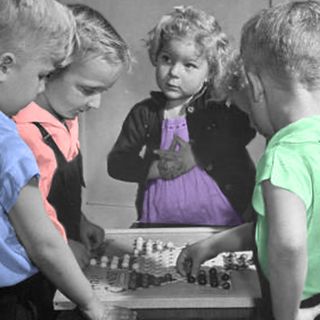
What’s It Like To Live With: A Child With Dyslexia
“Suddenly, I found myself being involved only in my son … leaving my daughter to do everything on her own.”

What It’s Like to Live With explores the stories of the loved ones living with and/or caring for people who see and experience every day a little differently.
My son was a few days into his Grade 1 when it became apparent that he may have dyslexia. I’d watched Taare Zameen Par, the Aamir Khan movie that touched upon this problem and tried to connect a few things I’d seen in the movie with how my son was behaving. Over time, it became clear that most of what was shown was how my son behaved, both at home and in school.
Also, I’d constantly compare how my daughter, older to my son by two years, behaved and coped with studies when she was his age. I realized that although my son was intelligent and articulate, he was being unable to read and write. That’s when it occurred to me that things may not be normal.
There have been times that his teachers have called him lazy and dumb, signed him off as being careless or immature, and that would hurt me so much. My husband used to work in Dubai, so although he was always there on the phone, I don’t think he realized what I was really going through.
Article continues below
On the one hand, I had a daughter who was topping her class; it was through her good review that my son’s admission process became easy. And on the other hand, I was constantly being told that he’d zone out or daydream and would be lost easily. Even at home, it wasn’t any different. We’d have a hard time making him sit and revise, or do his homework. He’d complain of dizziness, headaches and stomach aches while reading. I would notice that he got confused by letters, numbers, words and would also complain of numbers and words moving when he wanted to read or write.
We took him to the doctor and after several tests, they confirmed that it was dyslexia. The first thing we did was sit down as a family, and accept it as a lifelong problem, and [agree] that we’d do everything for him and be there for him, no matter what.
After the diagnosis, I had to change his school and that did take an emotional toll on me because even in special schools, it’s seemed so difficult for the administration to accept a child with dyslexia. They almost made me feel like my child and I were such a burden on them. It was a lot of running from pillar to post to find the right school for him and in the meantime, I tried to teach him at home through various techniques I’d learnt through the internet, and from various support groups that I’d become a part of.
Related on The Swaddle:
For Families of Kids with Autism, ADHD, Society Is More Difficult Than the Parenting
Suddenly, I found myself being involved only in my son and how I could do everything to make his life easy. This meant that I’d left my daughter to do everything on her own, often neglecting her on days she needed me. There were times when she was low, or had had a fight with her friends in school, but to me those problems seemed petty compared to what my son was going through. Over time, I noticed that she’d withdrawn herself and wouldn’t talk much at home or engage in family activities. I knew it was my fault — and now things looked even more difficult. I had both my kids’ problems to deal with, and it was too overwhelming. I had to call my husband back, even if it meant settling for a job that paid less. And that’s what happened. Our plan was always to join him in Dubai eventually, but we stayed put here and dealt with each day as it came.
Today, my son is in the seventh grade. Things look better, but I feel like I’ve lost a lot of ‘me time.’ If he didn’t have dyslexia, and was just as bright, we’d be in Dubai, or I’d at least have time to go back to my bank job, or take tuitions for underprivileged kids, like I’ve always wanted to. But with him, I have no time left because there are often times when he doesn’t want to play with other kids and I have to be with him. So, my life is all about him now. And thankfully, my daughter’s accepted that I will devote a lot of my time to him, so she helps me, too. I regret not being with her all the time, or missing some of her milestones, but when she grows up, I hope she forgives me.
This interview has been condensed and edited for clarity. As told to Anubhuti Matta.
Anubhuti Matta is an associate editor with The Swaddle. When not at work, she's busy pursuing kathak, reading books on and by women in the Middle East or making dresses out of Indian prints.
Related


Sore Nipples, Fussy Feeding Sometimes Signs of Tongue Tie
